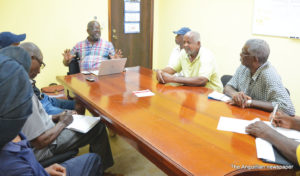
The Anguilla Farmers Association, (AFA) led by President Conrad Gumbs, met with Mr. John “Chris” Richardson, CEO of the Anguilla Water Corporation, to etch out a feasible reduction on the price per gallon of water to benefit local farmers.
Mr. Richardson had been holding discussions with the Ministry of Utilities, and the Corporation’s advisor, on a possible reduction to 3 cents per gallon. This was eventually agreed to, and he was pleased to inform the AFA members about the special new rate –a drop to 3 cents per gallon, up to 10,000 gallons, from a regular customary 12 cents per gallon.
Mr. Richardson mentioned that the Minister of Utilities had advised him to create a policy that would reflect the new rate. He said: “There are some farmers who would desire that I reveal what the potential policy entails, but it is important to note that the policy is in draft form still.” One of the special stipulations of the policy, according to Mr. Richardson, is that under no circumstance should a farmer connect the farm’s water supply to his residence.
Coupled with this approved cut was the sensitive matter of how long one should be given to prove his commitment to farming before being awarded the privilege to become a member the Farmers Association, and subsequently obtain the 3 cents per gallon benefit as a result.
It was the President of the Farmers Association who raised this concern. He said: “The period of a three-year waiting as a member of the Farmers Association, before one can get the 3 cents per gallon concession, is too long. There are young people out there who are interested in farming, and once the individual is consistent in farming they should be given a much less waiting period. What we want to do as a body is to encourage young farmers to farm, and there are those who are willing and ready to get involved. But I think that the 3-year waiting period should be drastically reduced.”
The farmers were extremely passionate about this particular matter. Traditionally, one interested in farming on a mass production scale would have to register with the association — and wait for a period of three years before being given membership privileges.
Many of the current Association’s members felt that this period of waiting was too long, and some of them thought that the status should take immediate effect upon registration. Others felt that 3 months was an ample period and should replace the 3 years. Still, others though felt that 6 months was a more justifiable timeframe for both the Association and the Water Corporation.
Mr. Richardson mentioned that there was a possibility of reducing the waiting time to 6 months — ample for ‘due diligence’ to play its course in proving the farmer’s commitment. By the end of the meeting, all in attendance agreed on a 6-month period.
By Staff Reporter, James R. Harrigan







